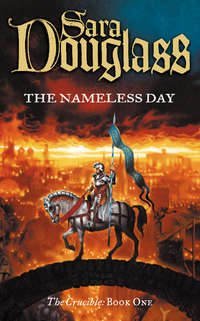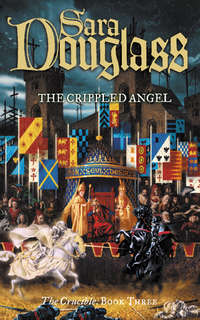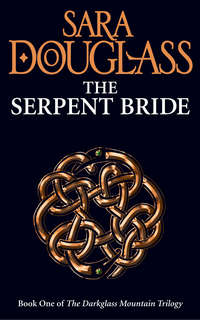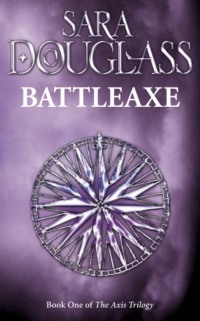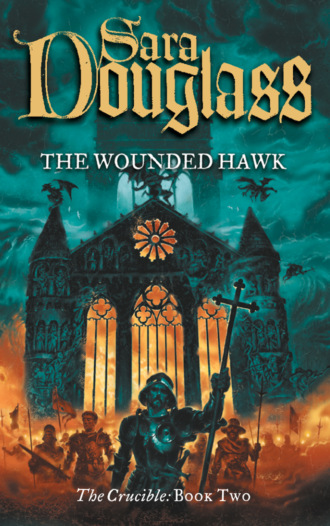
Полная версия
The Wounded Hawk
“But that would be madness!” Lancaster said. “We still have to rebuild our strength and resources, and replenish the coffers, after my elder brother’s fateful death.”
“Exactly,” Arundel said, “and Richard has determined the perfect way of raising finances for this folly. When Parliament meets in January, Richard intends to push for a new poll tax to raise the funds and repay the crown’s debts.”
“But the commons cannot afford a new tax,” Bolingbroke said. “Sweet Jesu, they are taxed enough as it is. There will be unrest as we have never seen.” He paused, and Neville knew that both Bolingbroke and Lancaster must be thinking of the still-at-large Wat Tyler and Jack Trueman, both of whom would surely use the bitterness caused by a new tax to create havoc. “Richard will be busy enough contending with war at home just as much as war abroad. And to send Hotspur abroad to lead this expedition … Lord Christ, Richard invites failure!”
And that, thought Neville, was nothing but resentment and jealousy speaking. Bolingbroke does not want Hotspur basking in the glory he will achieve if the expedition is successful.
“My heart is with England,” Arundel said, locking eyes with Bolingbroke, “and Richard will tread England into the dust. God in heaven, potentially he has another fifty years of life ahead of him. Bolingbroke, if you are for England, then I am for you and yours.”
Bolingbroke’s mouth quirked. “I am a wounded hawk, Arundel, fluttering defenceless about the ground. Richard will see to it that my wings be permanently crippled.”
Now Arundel rose to his feet and moved to Bolingbroke.
Stunningly, he dropped to one knee before him. “I am your man, Bolingbroke. Test me with what you will.” He raised his face and stared into Bolingbroke’s. “But be assured that there are men, not only in this room, but across England, who will offer their own lives to ensure that one day you will soar again.”
For Neville, as for every other man present, Arundel’s actions and words drove home the realisation that Lancaster was a finished man. Powerful he might be in terms of lands and wealth and the ability to raise arms, but Bolingbroke was the man who was going to inherit all that wealth and power and the love of men besides.
If the opposition to Richard grew so great that it coalesced about one man, then that one man was Bolingbroke.
It was in that single moment that Neville realised Bolingbroke’s life would follow one of only two paths: one path led to the executioner’s block, the other to the throne of England. It was total annihilation, or total victory.
And every other man in the room knew it, too.
Bolingbroke nodded, accepting Arundel’s words—
He has known this all along, thought Neville.
—and addressed the room.
“Your advice? What do we do now?”
“Wait,” said Sturry. “As Richard does not have the ability to move against you, so you do not have the ability to—”
“No!” Lancaster put his hand on Bolingbroke’s shoulder and pulled him back. “This talk is of treason and I will not have it in my house. Richard is young, and misguided. He still has my loyalty—”
Bolingbroke whipped about and faced his father. “Then you are a fool, father. Richard is not ‘misguided’, he is England’s death!”
Gloucester and Raby exchanged glances. “These are hot and hasty words thrown about the room,” Gloucester said, “and tempers need to cool before we commit to any action. My brother Lancaster is right to say that our family should repair to Kenilworth for the winter. The castle is well fortified, and even if Richard should be hasty enough to lay siege to it, we shall be safe.”
“And Parliament may not grant Richard’s request for a new poll tax,” Raby said. “Do we speak hot words for nothing? Does Richard merely need a year or two to settle down?”
Bolingbroke shot Raby a black look, but Raby ignored it. “We wait out Christmastide,” he said, “and for the moment we do nothing to further aggravate Richard. In fact,” and now it was Raby who shot Bolingbroke the black look, “it might not be the worst of actions to publicly pledge your loyalty to him, Hal. Richard needs to be appeased … and that will work as much to your favour as it does to his.”
Bolingbroke made as if to object, then a thoughtful look came over his face, and he nodded. “You speak wisdom, Ralph, as does my Uncle Thomas.”
“Then let us finish,” Lancaster said. “It will not be long before dawn tints the sky, and none of you dares be seen leaving the Savoy. Neville? Will you escort my lords one by one back to the wharf?”
It wasn’t until well after dawn that Neville had a chance to have a quiet word with Bolingbroke. They needed to plan to recover the casket.
“It must be soon,” Bolingbroke said, “for father is planning our removal to Kenilworth within the next week.” He shuddered. “I confess, Tom, it will be good to leave London for the moment.”
“I must have the casket—”
“Yes, yes, but, Christ Saviour, Tom, it is in Westminster. But do not fret, Raby’s words have given me cause for thought.”
Bolingbroke lapsed into silence. “And Arundel’s offer to be tested can be used to your advantage,” he said finally. “Tom, I have a plan, but it will require the utmost courage—”
Neville nodded and began to speak, but Bolingbroke hushed him.
“—and it will require the courage of our wives. Are you prepared to risk that?”
“You are?” Neville said.
“Aye.”
Still Neville hesitated, then finally he nodded. “Then, yes, I am prepared to risk them. I must, if it will mean I finally achieve possession of the casket.”
Something flared in Bolingbroke’s eyes, and Neville was not sure whether it was triumph or extraordinary pain.
“Then let me explain …” Bolingbroke said.
II
Sext, the Vigil of the Feast of St Francis In the first year of the reign of Richard II (late morning Monday 3rd October 1379)
—i—
They came to Westminster by small barge, rather than on horseback, because it would be less awkward spiriting the casket away.
It would also be faster.
And safer.
Robert Courtenay, subdued because Neville had ordered him to remain behind, had waved them farewell from the Savoy’s river gate, and now they slipped silently, almost secretively, round the great bend in the river which would bring them to Westminster. Several men-at-arms sat in the stern of the barge with the two men who poled it through the choppy river waters. Bolingbroke, Mary, Neville and Margaret sat close to the bow, on wooden benches made comfortable with soft cushions and draperies.
Everyone was tense. Bolingbroke sat with his head steadfastly down, as if fascinated with the planking of the barge. Margaret sat white-faced, her hands clasped tight in her lap, terrified of an encounter with Richard.
Neville glanced at her from time to time, torn between his desperate need to achieve the casket and an almost equally desperate worry about what Richard might do to Margaret. Would she be safe? With Richard? Hal had said it would not take long to get the casket—not with the aid they had waiting for them in Westminster—and Mary and Margaret would not be placed in danger for long.
For an instant, Bolingbroke raised his head and locked eyes with Neville, then looked away.
We need Mary and Margaret to distract Richard, Neville reasoned with himself, even as he fretted over his concern for Margaret. Why waste time on disquiet? Margaret knows the stakes … she knows the risks.
But each time Neville closed his eyes he thought he could see a gigantic spider scurrying across a shadowed chamber, wrapping Margaret in its loathsome legs as it bore her to the floor.
No! Cease such fancifying! Bolingbroke was right … they would take but a few minutes to seize the casket, and Margaret would be in no real danger. All would be well. This afternoon he would have the casket, and the truth would be in his hands. Richard would have a day or two more of life only.
And so Neville leaned back against the side of the barge and tried to convince himself of this fact: Margaret would come to no harm, all would be well, and by this evening, tomorrow at the latest, the demons would be sent scurrying back to hell.
Mary, although she recognised the tension in the others, did not realise the full extent of the deception of the day. All she knew was that Richard had turned against her husband, who had done no wrong, save that he was more golden and glorious than the king. As Richard would not see Bolingbroke, Mary understood Bolingbroke’s request that she entreat an audience with her sovereign so that she might beg Richard to allow her husband to pledge his steadfast loyalty. It was a shame her husband’s pledge could not be more public, but there would be no public opportunity before the entire Lancastrian household moved to Kenilworth. Private must do, and there would surely be witnesses enough.
Margaret accompanied her in her capacity as her attendant gentlewoman, and Mary was heartily glad she had Margaret’s support.
She had no idea of Margaret’s terror.
When they docked at Westminster’s pier, Bolingbroke stepped out, aiding first Mary and then Margaret from the barge. There was no time for speech, hardly time even for thought, but Bolingbroke gave Margaret’s hand a brief squeeze as she stepped from barge to pier: a futile, hopelessly inadequate gesture of support.
She turned her head and would not acknowledge him, and Bolingbroke wondered if she would ever speak to him again.
This is such a pivotal, critical day, he thought, and from it we hope to achieve victory. But is victory worth the pain that will be visited on Margaret?
And then Bolingbroke thought of what awaited them if this day failed—the torments of hell everlasting—and he hardened his heart, and turned away from Margaret.
Arundel was waiting for them by the water gate leading into the Westminster complex, and as they approached he spoke quietly to the guards, who raised their pikes and allowed Bolingbroke’s party through.
Bolingbroke raised his eyebrows at Arundel, and the earl nodded.
“We have done all we can. Come, if we delay longer the king will depart for his afternoon’s hunting.”
They walked briskly along a westerly path before turning south along the west wall of the great hall. Most of the old roof had gone, and the hall was now exposed to the elements. Craftsmen and others scampered over the great ribs of the new roof, working desperately against the inevitable onset of the autumn and winter rains.
No one, save one or two of the men-at-arms, spared the activity a glance.
Arundel led them to the doorway of a small atrium in the southern-most part of the palace complex. Inside the atrium, three doors led, in turn, to the lesser hall, the Painted Chamber, and the complex of private apartments known collectively as the Queen’s Chambers.
Where, now, Richard had made his nest.
The atrium was cold and comfortless. Guards stood at each of the three doors; all stared with hard eyes at the newcomers.
Arundel walked over to the two guards standing by the door leading to the Queen’s Chambers.
“The Countess of Hereford and her lady companion wish an audience with the king.” Arundel grinned easily. “I can assure you they carry no weapons save for their feminine charms.”
Mary squared her shoulders and held the guards’ stare; a wan and tight-faced Margaret kept her eyes averted.
One of the guards disappeared, reappearing in a few moments.
“My ladies,” he said, and stood back so that they might pass through the door.
As Margaret followed Mary through she turned and sent Neville a look of such stark terror that he took a half-step forward, stopping awkwardly as Bolingbroke caught at his arm.
And on that look, the fate of the world turned.
The door closed behind them, and Neville was left staring at its blank, wooden face.
“Tom!” Bolingbroke whispered. “Tom!”
Neville took a deep breath and forced himself to turn away from the door.
It would be all right. Margaret would be safe. They would not be long.
Then the door which led to the Painted Chamber opened, and Sir Richard Sturry walked into the atrium.
“My lords!” he said, as if surprised. “Sweet Jesu smiles upon me indeed. His Grace has asked me to transfer back to the abbey some of the registers he has been studying, and I have been wringing my hands at the thought of finding someone—or four or five someones—to aid me in this endeavour.”
He beamed, and threw out his hands. “And here stand my Lords of Hereford and Arundel, and Lord Neville, complete with an able-bodied contingent of men-at-arms. My Lords, may I …”
Bolingbroke smiled. “My men are yours for the asking, Sturry. I cool my heels in this frigid chamber awaiting my sovereign’s pleasure, but there is no reason why they should suffer along with me. Take them if you will, that they may keep warm with some godly work.”
Sturry positively beamed. “This chamber is cold and heartless, is it not? Why not await Richard’s pleasure in the Painted Chamber? I am sure his men,” he half bowed at the sergeant-at-arms, “can fetch you from there if need arise.”
The sergeant opened his mouth to protest, but Arundel spoke first.
“I will vouch for my Lord of Hereford and Lord Neville,” he said. “There shall come no harm from their waiting in the Painted Chamber.”
The sergeant closed his mouth, thinking it over. Arundel and Sturry were trusted confidants of the king, and Arundel a privy councillor besides.
Конец ознакомительного фрагмента.
Текст предоставлен ООО «ЛитРес».
Прочитайте эту книгу целиком, купив полную легальную версию на ЛитРес.
Безопасно оплатить книгу можно банковской картой Visa, MasterCard, Maestro, со счета мобильного телефона, с платежного терминала, в салоне МТС или Связной, через PayPal, WebMoney, Яндекс.Деньги, QIWI Кошелек, бонусными картами или другим удобным Вам способом.


